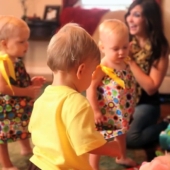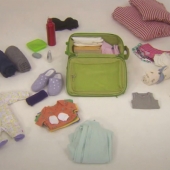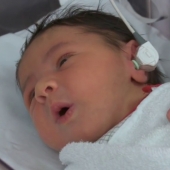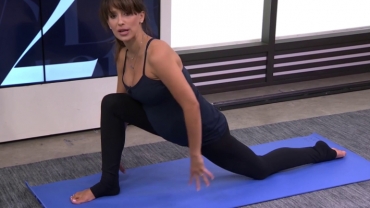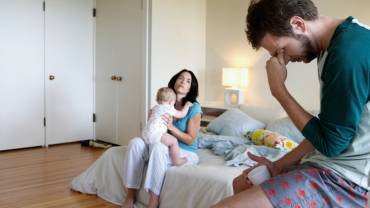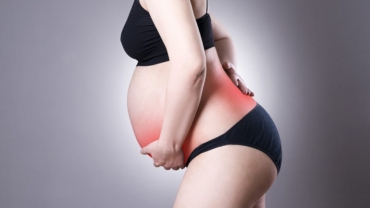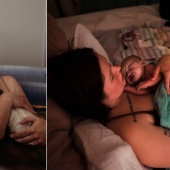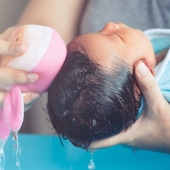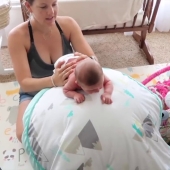The first few minutes and hours after birth is an important time for a mother and her new baby to bond. Spending time together and skin to skin contact for the first hour of life is especially helpful in making the transitions after the birth's successful for you and your baby.
Skin-to-skin contact means the baby's naked skin comes in direct contact with the mother's bare skin. The skin-to-skin contact helps stabilize the baby's blood sugars and body temperature. It helps the baby's heart rate and breathing become more stable and it's very calming for the baby. This quiet bonding time is also helpful with the baby's first feeding.
A mother's body benefits from skin-to-skin contact too. It helps the mother's uterus contract which helps decrease bleeding and it also helps stimulate a mother's milk hormones if she is breast feeding. We encourage you to hold your baby skin-to-skin as much as possible in the first few hours and days of life. Baby's who are held against their mother's or father bare skin are often happier and healthier.
There may be times when your baby might not be able to be placed skin-to-skin right after birth, due to a medical problem. If this is the case, we will do our best to let you know ahead of time and explain why. After the first hour of life, we will apply an antibiotic ointment called azithromycin to your baby's eyes. This helps prevent eye infections that can be caused by bacteria in the birth canal. This ointment should not cause any problems for your baby.
We will also give your baby a shot of vitamin K soon after birth. This is a special vitamin that is made by the liver. Vitamin K helps blood to clot and helps prevent bleeding. Baby's are born with low levels of vitamin K and it takes a few weeks for their liver to start making enough vitamin K to help stop bleeding. Without the vitamin K shot, babies can develop serious bleeding in their skin, intestines and brain. The shot will cause some brief discomfort at first but should not cause any other problems for your baby.
Security in the Birthing Pavilion
After birth your newborn is given a foot band and an armband. These are stamped with your baby's name, date and time of birth. Mothers and their significant others receive a matching band. Our healthcare staff with check the bands to identify both the baby and the parents before any test or procedure is performed and anytime your baby is returned to you after spending time outside of your room. An infant security tag will be attached to your baby's ankle as a special security measure. If this tag gets close to one of the Birthing Pavilion's exits, it will set off an alarm and lock the door.
To keep from setting this alarm off accidentally, please try to stay clear of the exits when you wheel your baby through the hallway in his bassinet. The alarm will also trigger if the tag gets wet, if it falls off or if someone damages it. Babies often lose weight after birth so tell your nurse if the tag becomes so loose that it might fall off. For safety and security reasons, when babies are outside of the room, they must be pushed in their bassinet. Staff members will questions anyone carrying a baby in their arms. Even another staff member. This is one of the best ways we can make sure your baby remains safe.
Early Tests and Procedures
A day or two after the birth, we will perform several important procedures and tests for your newborn. Sometimes these are done in the Newborn Nursery and sometimes they are performed in your room. If your baby needs to go to the nursery, you are welcome to come along and help soothe him or her with your voice and your touch.
To help keep your baby healthy and to identify certain medical conditions before they become problems, we will perform a special blood test called the Newborn Metabolic Screen. This is sometimes called the PKU test. We will take a few drops of blood from your baby's foot to perform this test. This test can tell us if the newborn has problems in producing certain types of hormones such as in hypothyroidism.
It can also detect if a baby will have problems breaking down food or in using his nutrition such as with conditions called PKU and Galactosemia. Without screening, these problems may not show up until a baby becomes very sick or has delays in his development. If the screening test shows that there may be a problem, your doctor will do extra testing.
If this follow up testing shows that there is truly a problem, a special medicine or diet can be prescribed to help keep your baby from getting sick. You will receive results on your baby's newborn screen at the two week well child visit. If there is a problem on the newborn screen, you should hear from your baby's doctor before this visit.
Your baby will also be tested for Jaundice, a common newborn condition which makes a baby's skin turn yellow. Jaundice develops when a yellow chemical called bilirubin builds up in the body. Bilirubin is formed when a baby's red blood cells break down which is a normal process after birth.
Babies get rid of bilirubin through the liver and then through their stool or poop. Since a newborn's liver is not very mature at birth and because babies don't pass a lot of poop in their first few days of life, extra bilirubin can build up in the baby's blood. The bilirubin can then get into the skin and cause it to look yellow.
Most babies get a little Jaundice in the first few days of life and normally this does not cause problems. But some babies can get so yellow that they need help getting rid of their Jaundice. To find out if Jaundice is going to be a problem for your baby, we will perform a bilirubin blood test. This will be done at the same time as the newborn screen to help limit an extra poke for your baby. Your baby may have a bilirubin test performed earlier if there are any concerns about her looking too yellow for her age.
While we perform these tests, we will give your baby a very small amount of sugar water to suck on, this helps lower pain. Breast feeding your baby and holding her skin-to-skin a little, just before these tests, can also help to limit pain.
Most new babies hear well at birth, but some do not. About one to three of every 1000 babies will have a true hearing loss We screen your newborn for hearing loss with a special machine. The screening test is easy and is done while your baby is resting or sleeping.
Some babies may not pass on the first try. This can be due to noise in the room or because the baby is moving around. If your baby does not pass on the first try, we will repeat the hearing screen one more time before you go home. If he does not pass on the second try, we will contact the audiology department and ask that they call you at home to schedule an appointment for more testing.
We also recommend that your baby receive the Hepatitis B Vaccine before going home from the hospital. The Hepatitis B Vaccine is an important first vaccine for a baby. It has been recommended for all newborns by the American Academy of Pediatrics and the Centers For Disease Control for almost 20 years.
If a new baby is exposed to the Hepatitis B virus, a serious infection of the liver can develop. The vaccine helps to prevent this. This vaccination is recommended even if the mother's Hepatitis B test result is negative during her pregnancy, because testing is not always accurate or sometimes the mother can develop the Hepatitis B infection after her test is done. The Hepatitis B vaccine is a safe an effective vaccine. The shot will cause some brief discomfort to your baby at first, but it should not continue to hurt and it is unlikely to cause any other problems.
Some babies are born with a dangerous heart condition that can cause a low level of oxygen in the blood. For this reason, we will perform a special oxygen test on your baby before you go home. This test is painless and can be done right in your own room. If this test shows that your baby has a low level of oxygen in the blood, we will perform extra oxygen testing to make sure that you baby's heart is healthy. If the extra testing shows that your baby may have a heart condition, we will perform an ultrasound of your baby's heart called an echocardiogram. This will look at the structure of your baby's heart to see if there is a problem.
Feedin Your Baby
One of the best things a newborn can do to get the best start in life is to be a healthy eater. Babies need to eat often because their stomachs are very small. At first they can only eat about two to three teaspoons at a time. Sometimes their stomachs are full of amniotic fluid right after birth. For this reason some babies are not very hungry at first.
As their stomachs grow and they get rid of this fluid, they are able to eat more. Usually newborns eat about every two to three hours or so whether it is daytime or night time. Sometimes they need to eat only one to one and a half hours after their last feeding. This pattern is called cluster feeding. In the first few days of life, babies often are hungriest at night and do most of their cluster feeding then.
This can be quite tiring for new parents so make sure you take every chance to nap during the day when your baby is sleeping. Limit visitors during the day for these first few days to make sure you and your baby get all the sleep you need. Babies will show you when they are hungry by licking their lips, sucking on their hands or opening their mouths wide when you touch their lips or cheeks.
Your baby should show you these cues at least every few hours. If it has been about two and a half to three hours since the last feeding, unwrap your baby down to the diaper and use skin-to-skin contact to help or her wake up and get interested in feeding.
Some parents worry that allowing their baby to feed very frequently will spoil their baby. You cannot spoil your newborn. Try to feed your baby whenever he or she shows you hunger cues and before he or she start to cry. Crying causes air to enter a babies stomach leaving less room for milk. Crying also causes babies to be gassier and fussier. You will find that your baby is happiest when you feed her just as she is starting to get hungry.
Brest feeding is the healthiest type of feding for new babies and has many benefits for their new mothers as well. For newborns, breastfeeding is especially important in helping fight off infections because the mother's early milk called colostrum has a lot of infection fighting properties.
Breastfeeding also helps to lower a baby's chance of developing asthma, a condition of the lungs that causes problems with breathing. Eczema, an itchy skin condition. Type one and type two diabetes, childhood leukemia, obesity and Sudden Infant Death Syndrome.
Babies are born with natural instincts to help them breastfeed. Just placing a baby on a mother's chest whilst she is laying back a little bit will bring out the baby's natural feeding insticts. Babies can often find their way to the breast and latch on without any help at all.
Sometimes babies can have difficulties breastfeeding just as some babies can have difficulties with bottle feeding. Our nurses will help you learn how to breastfeed your baby. We also have lactation consultants or breastfeeding specialists who can help you if you are having any problems.
Breastfeeding is the healthiest choice for both moms and their babies. On rare occasions, some mothers and babies are not able to directly breastfeed. If you will be bottle feeding your baby breast milk or formula, we will also help you learn how to do this safely. Whether breast feding or bottle feeding, it is important to feed your baby when hungry and until she or he is content.
Babies show contentment by falling asleep after a good feding or by pushing the nipple out of their mouth. Babies often pause a little during feding to take a rest to decide if they are hungry for more milk. After you baby has taken this rest, see if he or she is interested in feeding more by squeezing your breast to give a little more milk or by tickling your baby's lip with your nipple.
If you baby doesn't seem interested in feeding anymore, see if he or she needs to burp. Most babies will be able to bring up a burp within a few minutes, while other babies may not need to burp at all. An excellent way to judge how well your baby is eating is by noting the number of wet and dirty diapers each day. Your baby should have at least one dirty and one wet diaper in the first day of life.
Then one more of each for each day older. So on the second day there should be at least two wet and two dirty diapers and on the third day three of each and so on. This starts leveling off to about six to eight of each wet and dirty diaper per day when your baby's about one week old. It is a good idea to buy lots of diapers now.
In the first few days, a baby's poops are very dark and tarry looking and are very sticky. These poops are called meconium. A baby usually passes all of her meconium in the first two days of life. Then the stools start to get less sticky and turn green. Then brown, then yellow. When you see these changes, you can feel good knowing that your baby is feeding very well.
The most exciting events after a birth is finding out the baby's birth weight. Your baby will be weighed right after birth and then early each morning during your hospital stay. Most babies will lose about 8% of their birth weight in the first few days of life. This is because they are born with extra fluid in their body to help them stay hydrated and when they pee they lose this weight. The first few stools called meconium also weigh a lot and this causes babies to lose weight too.
Some babies will lose more than 8% of the birth weight if their mothers had a lot of fluid during labor or if their labor was very long. We will help watch your baby's weight and make sure he or she is losing the right amount and not too much. By about day four, your newborn will stop losing weight and then will start gaining about a half an ounce a day.
Babies are usually back to their birth weight by the time they are two weeks old and some get there sooner. Feeding your baby often at his or her early feeding cues and at least every three hours helps keep your baby from losing too much weight. It also helps your baby start gaining weight and the right amount at the right time. Remember to feed your baby at the first sign of hunger and until she or he is totally content.
Sleep Patterns and Your New Baby
One of the biggest transitions for a new baby is learning to be away from his or her mother. While living in your belly, you held your baby all the time so it'll be natural for your baby to want to be with you all the time after birth. A mother's touch makes the baby feel safe and secure. We strongly recommend against falling asleep in bed with your baby. Mothers are often very sleepy after labor and from their pain medicine as well as from the baby's frequent night time feedings.
Falling asleep in bed with your baby increases the risk of suffocation and of falling out of the bed. Our hospital beds are narrow so they are especially unsafe for bed sharing. If you are feding you baby in bed and you feel sleepy, please let your nurse or support person know so that they can help you hold your baby. When you are finished feeding, place your baby into the bassinet so that you both can have a restful safe sleep.
After the birth it will be helpful to find ways to make your baby feel comfortable lying alone in the bassinet, whether awake or asleep. While you're in the hospital, we will teach you how to help your baby feel comfortable sleeping alone in the bassinet.
We'll also teach you how to make her sleep time the safest to help prevent a condition called SIDS or Sudden Infant Death Syndrome. Having your baby sleep on his or her back is one of the best ways to prevent SIDS.
It is also really important to make sure there are no loose blankets, pillows or stuffed animals in your baby's sleep space. You and your partner need to sleep whenever your baby sleeps. This is especially important during the daytime so you can be more rested at night for night time feedings.
Naptime and Visitors
Remember to limit visitors during the daytime so you can get your sleep. Please ask visitors not to come in between two and four in the afternoon so that everyone can have some quiet time and a nap. We have signs that you can put up on your door when you are taking a nap so that no one interrupts your sleep. It's a good idea to ask visitors to wash their hands before they hold your baby.
Baby's immune systems are not well developed yet so they are at a high risk for getting infections. As we mentioned earlier, breastfeeding helps babies develop their immune system and can help fight off infection but they are still at risk of getting sick. We also recommend that you do not allow anyone with a cough, cold, fever or other contagious illness to visit you or your baby in the first few months of life.
Period of Purple Crying
One other important thing to know about babies is that they can cry a lot, this is normal. Crying is a baby's special way of saying she or he is hungry, uncomfortable, or stressed about something. Sometimes babies seem to cry for no reason at all. One of the best ways to calm a fussy baby is to put her skin-to-skin with her mother or another care giver.
Another way to help calm a fussy baby is with swaddling. Swaddling means wrapping a baby in a blanket. Holding a baby close and gentle swaying, rocking or jiggling is also very calming. Having a baby suck on your own hand, an adults finger or a pacifier can help calm a crying baby too.
We do recommend waiting on introducing a pacifier however until you know breastfeeding is going well. And sometimes sucking on a pacifier can cause problems with how a baby breastfeeds. It is also important to see if you baby is hungry first, anytime it looks like she wants to suck. Babies like a shushing sound because it sounds like the noises inside the womb. You can make a sound like in your baby's ear to help calm her down.
If you have a very fussy baby especially one who's hard to calm down, it is important to have friends or relatives close by who can help. If you are feeling overwhelmed with your baby's crying, gentle place your baby in the bassinet and ask a friend or family member to help while you take a break.
If you are alone it is also okay to put your baby in the bassinet and walk away for a while to give yourself a little break. The bassinet is a safe place and it will be okay for your baby to be on his or her own for a little while.
Remember that it is normal for babies to cry. Sometimes babies cry for long periods of time and sometimes for no reason at all. It is important to know that you should never ever shake your baby to stop the crying. Shaking can be very dangerous and can cause serious brain damage and other injuries.
Further Tests and Treatments
Some parents choose to have their son circumcised for cultural, religious or personal reasons. If you would like your son circumcised you will be asked to sign a consent for and watch a video that talks about circumcision and reviews it's risks and benefits.
Your baby's pediatric provider will make sure your baby's penis and foreskin look healthy and that he is healthy enough to have the circumcision performed. If your pediatric provider does not think your baby is ready to have a circumcision performed before you go home or a provider is not available to perform the circumcision, we will help coordinate this procedure as an out-patient.
Because a circumcision is not medically necessary, some insurance companies do not cover the cost of the procedure. Check your company's policy before having your baby circumcised to find out whether or not they will help pay for it.
- 13395 views

